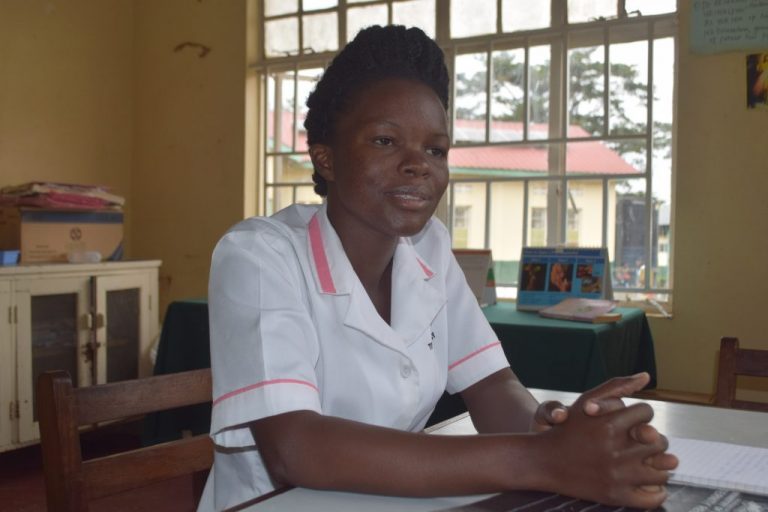Midwife Nancy Tibejuba’s baptism of fire into midwifery came in early 2017, hardly two months after transiting from a small private clinic into a hospital setting, writes Kakaire Ayub Kirunda.
But just a little over a month after being employed at St Francis Hospital Buluba in Mayuge District in Eastern Uganda Nancy found herself in a very challenging situation. She was on ward with an equally inexperienced colleague when she had to manage a case of an over bleeding mother after delivery.
“We catheterised the mother, we gave oxytocin, we looked for tears and they were sutured but the mother was still bleeding. Then on the issue of misoprostol we were not very certain what to give and how often. So, we had to call in the doctor to help us,” recalls Nancy.
Prior to involving the on-call doctor, panic set in and so many thoughts were running into Nancy’s mind, wondering what her fate would be in case the mother died.
“I was afraid. I was still new. I was worried of this mother dying in my hands. The caretakers were around. I didn’t know how they would react. I didn’t know how I would explain to management if the mother died. I even thought of being suspended for lack of skills.”
The Turnaround
Fast forward to 2018, Nancy is no longer the timid midwife who joined St Francis Hospital Buluba about one and a half years ago. She now exudes confidence and loves what she does, thanks to the Pronto In-Situ simulation based obstetrics and newborn emergency training and clinical mentorship under the auspices of the East Africa Preterm Birth Initiative (PTBi-EA) project.
Partnering with Makerere University School of Public Health in Uganda, PTBi-EA is working in six Ugandan hospitals in the Busoga sub-region to reduce mortality and morbidity among preterm babies. In addition to Pronto, the intervention package also includes data strengthening, quality improvement cycles, and the WHO’s safe childbirth checklist.
In her own words, Nancy says she was “quite raw” because she had forgotten many things she learnt in midwifery school after staying for close to two years at a clinic where she didn’t practice midwifery.
Feeling challenged and bothered, she kept asking colleagues to remind her many things to get to the same level as them. And when she was selected to start participating in the Pronto training sessions, it turned out to be the turning point for Nancy as far as revitalizing her midwifery practice was concerned.
“I have learnt very many things and as of now I am very confident. I can handle every condition that a mother or newborn presents unless it is beyond my thinking capacity. That is when I involve a doctor,” says Nancy. “Pronto helped me learn how to manage obstetric emergencies like preeclampsia, eclampsia, post-partum haemorrhage, and preterm labour. By the time the doctor comes I will have done some substantial work.”
Similarly, for Nancy and her peers, the training and complimentary bedside clinical mentorship has empowered them to confidently handle preterm babies and sick newborns. “We are conversant with identifying danger signs like breathing problems, hypothermia, hypoglycemia. We can initiate and manage the required interventions. Then on the issue of respiratory distress, we know when to put the baby on oxygen and how much oxygen to give.”
What does Nancy find interesting about the Pronto approach? “I find it exciting because of acting out scenarios. In most training there is a lot of theory. One of the biggest disadvantages in our midwifery schools is that the numbers are big and becomes impossible for every student to get hands-on training. But with Pronto, it does not only have the advantage of coming to the hospital, but everyone is given an opportunity to act out scenarios, talk and discuss issues.”
In a parting shot, Nancy (below, left & right during a Pronto simulation training session) urges those in charge of curriculum development in Uganda to integrate newborn care in midwifery training.
About Pronto simulation training and mentorship
The goal of Pronto simulation training is to build capacity of hospital teams to manage obstetric and neonatal cases during the intrapartum and immediate postpartum period. The approach focuses on strengthening use of evidence-based practices (EPBs). In addition, communication and team working of providers is emphasized.
In Uganda, Pronto training has been complemented with clinical mentorship. After Pronto simulation training sessions, mentors also spend half a day supporting providers in implementing the EBPs. The subsequent clinical mentorship has been useful in facilitating the translation of training knowledge and skills acquired into practice for better performance.
Ten Ugandan national trainers and 160 health workers in four hospitals have so far benefited from Pronto, but the number is set to go up when the two control hospitals come on board mid this year.
This blog is a cross-post from the Makerere University Centre of Excellence Maternal Newborn and Child Health.
